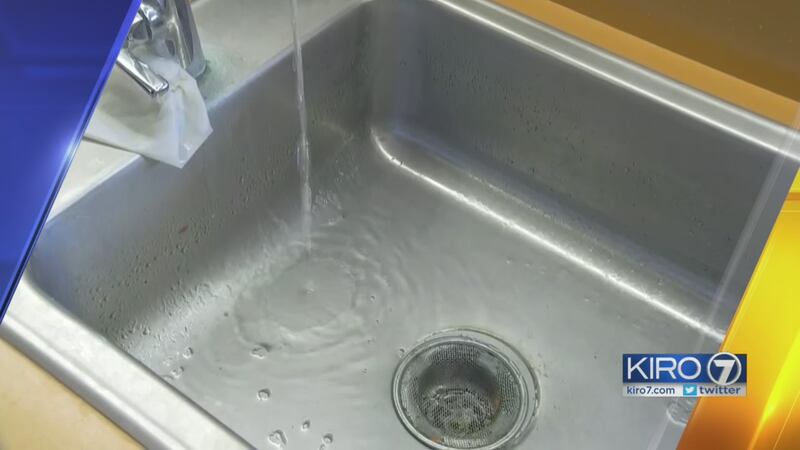The Tenino School District is telling parents that its water tested above the levels deemed acceptable by the EPA.
State testing found lead in the water of 29 drinking fountains and sinks at the district's middle school and elementary schools
How much lead is coming out of which sink or water fountain is on the school's website, and the district sent a letter to elementary and middle school parents last week, and to Parkland Elementary parents Friday to notify them about the lead.
“Scary because my kids drink that,” said Deanna Hurd, a parent to kids in 6th and 8th grades.
State testing found there's lead coming out of 23 sinks and six water fountains at the Tenino school district, at levels of 20-parts per billion or more. That’s a level the EPA calls “action level” for schools, or should be a concern.
“There is no level of lead that's really safe in water. So we really want to help get the schools get the lead in their water as low as possible,” said Lauren Jenks, the environmental public health sciences director for the Washington State Department of Health.
The Tenino School District is one of the first schools in Washington to volunteer for the new state-funded testing program, that was approved by the state legislature in 2017. The program is just starting to get test results in for a first round of testing, and has a total budget of $3 million.
The Tenino School District superintendent was out of town, but said on the phone that district wanted to be proactive and volunteered because most of its buildings were built in the 1970s.
“Given the age of the buildings, I'm surprised we didn't have higher concentrations (of lead),” said Joe Belmonte, the district’s superintendent. “Our plan was to act immediately and work to remedy this.”
The state believes the lead is coming from old fixtures - not pipes.
Middle school principal, John Neal, showed KIRO sinks and faucets impacted.
Some water fountains are turned off and others are wrapped shut.
Sinks with more than 10 parts per billion of lead have clear signs that say, "Hand washing only, not for drinking use."
The district plans to replace all these fixtures.
Meanwhile, the school is providing bottled water for drinking and has many fountains where the water has no detectable lead. The water that the schools use for cooking was under 10 parts per billion for lead.
But families are still worried.
“It brings the same anxiousness that you have about anybody that's going to be drinking lead in the water,” said Cindi Henderson, whose grandson is in the 8th grade.
Parents say they know that lead impacts brain development. It also accumulates in the body.
“I do think about it, I am really concerned about it. Both my younger children are on the autistic spectrum with some struggles. I think lead could definitely contribute to that,” Hurd said.
But the WA Department of Health wants to make clear low levels of lead in water is not likely to cause lead poisoning.
“We’re not really seeing cases of lead poisoning where the child was just exposed to the water. We don't think the water in the school is going to cause lead poisoning,” Jenks said.
But it says if your family is also exposed to another source of lead - like you live in an old home with lead paint or pipes.. And you're worried - talking about a blood test with your child's doctor, is a good idea.
The state has tested dozens of schools so far, in its new program, starting with older buildings - and every single one has come back with lead in its water.
The Department of Health is commending the Tenino School District, saying it's doing everything right and encourages other districts to also get tested.
It has enough funding to test 500 schools over two years.
More news from KIRO 7
- Dog deemed 'unadoptable' to become first-ever deaf K-9 in Washington
- Soldier knocks out girlfriend, leaves baby on side of road, flees police, officers say
- 25,000 NHL season ticket deposits made in Seattle's bid for expansion team
- Crash involving logging trucks sends log through truck's cab
- PHOTOS: Logs from one truck slam through windshield of second logging truck
Cox Media Group








